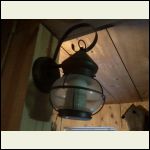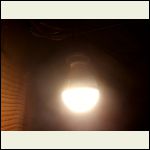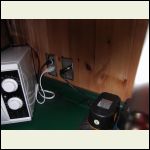|
| Author |
Message |
Durk
Member
|
# Posted: 25 Jan 2016 06:17pm
Reply
A little bit of knowledge can be dangerous. I've been reading up on the subject of 12 volt vs 120 volt on this forum and elsewhere, but am looking for some advice. The cabin will be built this summer in NW Montana, is 16 by 26, and is off grid. Electrical needs are simple: a few lights (no more than 4 or 5 at a time) a water pump such as a Shurflo to pressurize my low pressure gravity system, some phone and computer chargers, and occasionally a vacuum cleaner, sewing machine and power tools. I have a 2000 watt inverter generator which I would use to run the occasionally used items. I will probably start with 4 6 volt deep cycle batteries and a 3 stage charger.
For some lights , a Shuflo water pump, and computer/phone chargers should I wire 12 volt into the cabin as well as a few 120 outlets to run the vacuum cleaner, etc., or just use an inverter and run everything 120? I've read that 120 volt wall switches can be used with 12 volt but will not last long due to arcing. Can 120 volt wall outlets be wired to 12 volt and a lamp be plugged in to them that has had the bulb replaced with a screw in 12 volt bulb? Would it be easier to forget the 12 volt completely even with my small needs? Is it more efficient (for my battery bank) to run an inverter and 120 led lights than to run 12 volt leds?
Any recommendations on a 3 stage charger or inverter?
Thanks in advance.
|
|
DaveBell
Moderator
|
# Posted: 25 Jan 2016 06:42pm
Reply
Blue Sky Energy MPPT charge controller sized 25% over your Solar panels if you go that way.
|
|
bldginsp
Member
|
# Posted: 25 Jan 2016 08:07pm - Edited by: bldginsp
Reply
If you are going to run any 120 AC then I'd say run it all 120 AC. With 12 volt DC you can operate far fewer appliances/lights on one circuit since the amperage is so much higher. With 120AC, and the needs you describe, you'll only need three or four circuits in a small cabin and maybe less. If you run both AC and DC you will buy a lot more wire. And you have to keep straight which is which. DC rated outlets and switches and lights are generally more costly. You should only use DC rated equipment on any DC system. Some equipment is dual rated. If you run both you need two subpanels, one DC rated.
You have some extremes in the appliances you describe in terms of power requirements. The power tools and vacuum cleaner are big users, the lights and chargers very small users. The Sureflow is somewhere in between, but would get used a lot more than the vacuum or tools. If it weren't for the Sureflow I'd say use a generator for power tools and vacuum on 120 AC, and set up lights and chargers on a very small DC system. But since you need enough battery storage to run the Sureflow repeatedly after the sun is off the panels, perhaps it is wiser to set it all up with a larger battery bank and inverter to AC to begin with.
Six is one half dozen of the other.
|
|
toofewweekends
Member
|
# Posted: 26 Jan 2016 01:26am
Reply
Durk,
you've more or less described our weekend cabin in Alaska. It's wired 120, golf cart batteries, small panel, 1800w modified sine inverter which we supplement with a 30 amp Iota charger mainly in mid winter. When we get cleaning fever and vacuum, I usually kick on the generator. Same for power tools and at least start up on a small fridge (in winter, we just set stuff outside). We run a Shurflo 12v pump that brings water from a jug, through a faucet. So it runs maybe a few minutes a day. Shower is in a separate building, separate battery/pump deal. We've got everything on one circuit, which is how I bought it not how I'd design it.
|
|
old greybeard
Member
|
# Posted: 26 Jan 2016 08:34am
Reply
I run parallel 12v and 120v systems. My set up is small and cheap, only using a 800w inverter. I do find the 12v lights, led, will work off my battery on the few occasions when the voltage drops below the inverter threshold. Plus when my batteries run low, usually when snow covered, its nice to turn off the inverter and just use 12v as needed. The inverter loss is a power hog, direct 12v is more efficient.
|
|
toyota_mdt_tech
Member
|
# Posted: 26 Jan 2016 08:55am
Reply
I would run all 120VAC stuff, and then if its 12V you want, hook in a 12V inverter, run your 120VAC on the 12V via the inverter. Have it both ways, one set of wiring, dual voltage capable.
|
|
rayyy
Member
|
# Posted: 28 Jan 2016 05:15pm - Edited by: rayyy
Reply
I asked myself this same question and #1.I want to turn a light or lights on any time day or night with out monkeying around with a genny or inverter.so all my lighting is on 12 volt battery.I want to turn on a water faucet and have flowing water hot or cold,day or night so the water pump is 12 volt battery.Charge my cell phone any time with out the generator or inverter running so that is 12 volt battery.My propane frig electronics needs a little 12 volt battery to run day or night so that is 12 volt battery.That's it on 12 volt battery power.These are the things I want to be able to have 24 hours a day without doing a thing.All other things are on the generator or the inverter that I power up when needed.The computer,t.v.,radio,air conditioner,microwave,k-cup coffee maker,toaster,blender,vaccuum cleaner,Battery charger (for the 12 volt batteries),washing machine,hair dryer,crock pot,amplifier(to my guitar)and anything else you can think of that gets plugged into 120 volts A/C,,,all on generator power when needed.The little picture below on a cabin for 12 volt is my set up.I have a 12 volt cigarette lighter outlet from the batteries along with a 120 volt outlet to the generator on each wall of my cabin.
|
|
Steve961
Member
|
# Posted: 28 Jan 2016 06:29pm
Reply
I am going to make the case for 120VAC. I am running most of my cabin on 120 VAC with a 300 Watt (600 peak) Morningstar SureSine Inverter. The self consumption when it's on is a paltry 450 mA, and just 55 mA when on stand-by. On average, my inverter is on for 10 hours, and on standby the rest. This is only 5 Amps in overhead per day to run the inverter, which even my small system can easily afford.
Having 120VAC has allowed me to use 14 gauge wiring, inexpensive LED light bulbs, tool chargers, laptop computer, LED TV, and all sorts of gadgets that make life a little easier. All this without having to start a generator or turn on a separate inverter. In fact, I haven't had to haul my eu2000i to the cabin for over 2 years.
I have had to make some compromises though. My only permanent power tool is a DEWALT cordless drill. Everything else, such as saws, are manual only - which isn't a problem as long as I'm not actively building something. All of my appliances also have to work within the 300 (600 for less than 10 minutes) watt limit of the SureSine. This includes my stick vacuum cleaner and even a small rice cooker I found, which is not such a bad thing as it keeps my energy use very low.
There are two things I run on 12 volt though, my water pump and a highly efficient Coleman Sterling cooler. I could have easily gotten a 120VAC Shurflo that would have worked, but a 120VAC refrigerator would have required a much larger inverter. As it is, the battery is in the storage area where the water pump and cooler are so it no big deal to run the wires a couple of feet.
The convenience of 120VAC on tap at any time is one of the things I love most about my current cabin. My previous cabin of 15 years had no electricity at all - I'm getting to old for that kind of lifestyle.
|
|
|
Durk
Member
|
# Posted: 28 Jan 2016 08:52pm
Reply
Thanks everybody for your real world experiences. There are definitely benefits and drawbacks of running only 12 volt for small watt items. I like things simple, but finding good lighting and fixtures in 12 volt seems a bit tricky. Can anyone tell me specific types of 12 volt lights that have good quality light? How are the screw in 12 volt E26 5W bulbs for good warm light? I'd like to just pick one up and try it but none are available locally. What do you use for lights, rayyy?
I like the sound of your Morningstar inverter, Steve961, especially since it has no fan and therefore no noise. Your electrical needs sound similar to what mine will be. How do you charge your battery, solar? I don't mind the thought of running my gen for charging and running bigger items. Hopefully solar soon to augment battery charging.
|
|
Ontario lakeside
Member
|
# Posted: 28 Jan 2016 09:29pm
Reply
We do phones, tablets, water pump, lighting with 12volt system. genny for tools.
Our solar system is 1 100 watt panel and 2 small batteries, less than $200. we easily go weeks without firing up the genny .
|
|
Clipper
Member
|
# Posted: 28 Jan 2016 10:45pm
Reply
I struggled with this decision as well when I was designing my off grid solar at my remote cabin. I decided to run both AC and DC circuits and it works very well for my needs.
I run a 1000 watt PS inverter with three outlets in the cabin and ran a circuit to the shed for a shop light and another outlet to charge tool battery's. I run a few table lamps, TV, computer etc in the cabin.
DC circuit runs kitchen, 2 bedrooms and main room lights. Works way beyond my expectations and is very efficient. Put most lights on dimmers. Have USB and cigarette lighter charging station. I also ran a DC line to my outdoor shower water pump (6A) and it rocks it.
Pretty happy that I hedged my bets and went with both AC and DC.
|
|
rayyy
Member
|
# Posted: 29 Jan 2016 08:31am - Edited by: rayyy
Reply
I buy these 201 LED,corn lights (as they are called)on E-bay.I get them in 12 volt with the E-27 base in warm white.They give you the equivalent of an 80 watt incandescent light bulb but only use 13 watts.They are expensive but well worth it to me.Because my cabin lighting is wired up 12 volt,there is no chance of ever placing a 120 volt bulb in by accident.I also use some 5 watt led's out in the barn,s and chicken coop.
Picture0129160759_1..jpg
| 
Picture0129160827_1..jpg
| 
12_volt_and_120_volt.jpg
|  |
|
|
Steve961
Member
|
# Posted: 29 Jan 2016 05:00pm
Reply
Durk:
My system is solar powered. I have 318 watts of panels and a 110 AH AGM battery. I usually only have 128 watts of panel mounted on the roof, with another 190 watt panel stored inside for use on a ground mount if snow is covering the roof. My battery is a little on the small side, but I've never run out of power so far on any of my weekend visits.
I also used to charge my battery with my generator before I had my solar panels installed. Once I got my panels installed it seemed as if I had so much more power available to me. My battery just did not charge as well even though I was using an eu2000i and an Iota 30 amp charger with IQ4 installed.
|
|
NorthRick
Member
|
# Posted: 29 Jan 2016 07:13pm
Reply
Put me in the all 120vAC column. Like just about everyone here, I mulled over the 12vdc/120vac issue too. 120 stuff is both cheaper and much more widely available.
You didn't say whether this is a full time cabin or recreational. Ours is a weekend and we flip the inverter on when we get there and it stays on until we leave. That way, just like an on-grid house, things work when you want them.
Another thing is that you can set up your system so that when the generator is running, the power for the cabin comes from it and not the battery bank. I try to time battery recharging with any heavier power usage. Minimizes generator run time as you charge the batteries and run more power hungry things at the same time.
|
|
rachelsdad
Member
|
# Posted: 5 Mar 2016 08:36am
Reply
Quoting: NorthRick Ours is a weekend and we flip the inverter on when we get there and it stays on until we leave.
How much draw will an inverter put on the system?...or how much less time will I have on battery pack?
I'm really struggling with my potential set up now...
I did not know 120v vs 12v outlets could be problematic...
|
|
MtnDon
Member
|
# Posted: 5 Mar 2016 03:47pm
Reply
Quoting: Steve961 My battery just did not charge as well even though I was using an eu2000i and an Iota 30 amp charger with IQ4 installed
That is normal as the final 10 to 15% of recharging a lead acid battery is a slow process that is limited by the battery chemistry. Many folks who rely on charging from a generator never reach a true 100% charge. That is an automatic path to early battery death. Not to mention that the batteries self discharge when left sitting there between visits / use and charges. Another bad thing.
|
|
MtnDon
Member
|
# Posted: 5 Mar 2016 03:57pm
Reply
Quoting: rachelsdad I did not know 120v vs 12v outlets could be problematic
The big problem to me is IF there is both 12 VDC and 120 VAC in the same building they need to use outlets that are completely different so there is no possibility of anyone coming along and connecting an incompatible device. If there is ever an electrical inspection, using a 120 VAC outlet for DC is a guaranteed fail. You have to think of the unthinkable... like having a guest plug in something theyshould not.
|
|
razmichael
Member
|
# Posted: 5 Mar 2016 05:48pm
Reply
Quoting: MtnDon The big problem to me is IF there is both 12 VDC and 120 VAC in the same building they need to use outlets that are completely different so there is no possibility of anyone coming along and connecting an incompatible device.
I have a few standard 120 outlets placed around the cabin (wired to the inverter but normally off. For 12v I used outlet boxes and cover plates but drilled out holes and mounted standard car lighter type sockets (2 each). At the moment I think I only have one standard floor lamp with a 12V bulb and replaced plug with the 12V plug. I also have a number of the car type 12-USB adapters so the 12V sockets can be used for USB reading lamps, charging things etc. Works fine for our use. Because I use 120 so rarely, it is not an issue to just turn the inverter on when I need to vacuum or something that needs it. I suppose I could leave the inverter on all the time but it does draw some power sitting there.
|
|
skootamattaschmidty
Member
|
# Posted: 5 Mar 2016 06:06pm
Reply
We are off grid as well. I have a outlet 120v outlets that are active only when the generator is running. I have propane lights I use but I also have 12v led lighting in my bathroom, in my loft, over my couch and just installed one in my backroom. These are all hooked direct to my battery, through a fuse of course. I also have an inverter hooked to my battery I use for a couple lights and for charging battery drills phones etc. I do have one 12 volt outlet in my loft for my fan that looks like a regular 120 v outlet. I took a sharpie and clearly marked 12v only. It works for me.
|
|
|

